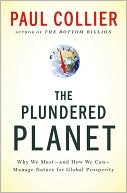The Plundered Planet: Why We Must--and How We Can--Manage Nature for Global Prosperity
Search in google:
Paul Collier's The Bottom Billion was greeted as groundbreaking when it appeared in 2007, winning the Estoril Distinguished Book Prize, the Arthur Ross Book Award, and the Lionel Gelber Prize. The Economist wrote that it was "set to become a classic," the Financial Times praised it as "rich in both analysis and recommendations," while Nicholas Kristof of the New York Times called it the "best nonfiction book so far this year." Now, in The Plundered Planet, Collier builds upon his renowned work on developing countries and the poorest populations to confront the global mismanagement of nature. Proper stewardship of natural assets and liabilities is a matter of planetary urgency: natural resources have the potential either to transform the poorest countries or to tear them apart, while the carbon emissions and agricultural follies of the rich world could further impoverish them. The Plundered Planet charts a course between unchecked profiteering on the one hand and environmental romanticism on the other to offer realistic and sustainable solutions to dauntingly complex issues. Grounded in a belief in the power of informed citizens, Collier proposes a series of international standards that would help poor countries rich in natural assets better manage those resources, policy changes that would raise world food supply, and a clear-headed approach to climate change that acknowledges the benefits of industrialization while addressing the need for alternatives to carbon trading. Revealing how these are all interconnected, The Plundered Planet charts a way forward to avoid the mismanagement of the natural world that threatens our future. Publishers Weekly How can poor countries escape the cycle of environmental degradation and poverty? Collier (The Bottom Billion) argues that technological innovation, environmental protection, and regulation are key to ensuring equitable development. Environmentalists and economists must work together so resources can be responsibly harnessed; if diamonds have sustained Sierra Leone’s bloody feuds, Botswana’s diamond industry has given it the world’s fastest growing economy. Collier explores where and how corruption insinuates itself during the discovery and resource extraction processes, how taxation and royalty on extraction may redistribute wealth to society, how to reinvest this wealth for the future, and how to use renewable resources sustainably. Despite the narrow treatment of “nature” as commodity and some questionable contentions that organic farming is “antiquated,” and that factory farming and genetically modified crops are the only way to alleviate hunger—claims easily challenged by more seasoned agronomists—Collier’s arguments are compassionate and convincing, and his straightforward explanations of economic principles are leavened with humor and impressively accessible. (May)
Introduction: Natural Disorder Part I: Boom at the Bottom 1. Going, Going, Gone2. The Scramble for Africa, Mark 2 3. Bonanza: Hunky Dory or Humpty Dumpty?Part II: Slash and Burn 4. The Breakdown of Custodianship Part III: How Growth Creates Hunger 5. Carbon Emissions and the Decline in Food Supply6. Asian Growth and the Increase in Food Demand Part IV: Restoring Natural Order 7. Handing the Planet On8. Facing the Food Crisis9. Old Morality and New Romanticism Conclusions Notes Index







